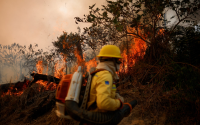29 October 2007Alexis Okeowo
Twenty-two African countries are experiencing their worst wet seasons in decades, and climate experts say that global warming is to blame.
Devastating rains and flash floods have affected 1.5 million people across the continent, killing at least 300 since early summer.
West Africa has seen its most severe floods in years, as torrents swamped the Democratic Republic of the Congo's capital of Kinshasa last week, killing 30 people in less than 24 hours.
In northern Ghana, more than 300,000 people have been uprooted by devastating downpours.
In East Africa, meanwhile, hundreds of thousands have been displaced and scores killed in Uganda, Sudan, Kenya, and Ethiopia (see map).
As the rains continue, African meteorologists are warning that these events may be fulfilling predictions that the continent will suffer some of the worst effects of global warming.
"Africa will be the hardest hit by climate change," said Grace Akumu, director of the Kenya-based nonprofit Climate Network Africa.
"This is happening even faster than expected."
Rising Waters
Uganda declared a state of emergency in September after at least 400,000 people were left homeless and hungry by torrential rains and floods in the northern and eastern parts of the country (see map).
The floods were of little surprise to scientists studying the effects of global warming here, said Philip Gwage, Uganda's deputy commissioner of meteorology. "We certainly expected the increased frequency of floods and droughts," he said.
Nonetheless many people in Uganda, and most other African countries, were unprepared for these severe events, he said.
"Immediately the biggest problem is that people cannot go back to their food supply—they have to rely on food aid," Gwage said.
Robert Balekere, a waiter whose family home is in eastern Uganda, said many families in his area have been cut off from supply lines and are having to rely on whatever provisions they have saved up.
"The roads are still not clear—there's a lot of rain and water in potholes," he said.
"Crops were washed away, but some food was stored in homes, so people have that until things normalize."
Akumu, of Climate Network Africa, said key crops may ultimately be wiped out and the food supply seriously threatened if such extreme weather continues.
(Read related story: "Global Warming Threatens Coffee Collapse in Uganda" [July 24, 2007].)
She added that Africa's "carbon footprint"— the total amount of carbon dioxide and greenhouses emitted on the continent—is far smaller than that of other continents, and she blamed industrialized countries for Africa's current rainy disaster.
(Get the facts on global warming.)
"Africa is suffering because of the actions of the others, the principal emitters of greenhouse gases," Akumu said.
Future Prevention?
Floods, droughts, and landslides are expected to occur more often in Africa, along with the appearance of diseases such as typhoid, cholera, and malaria, Akumu said.
"Extreme weather will become more frequent," she said.
James Magezi-Akiiki, climate change specialist with Uganda's Department of Meteorology, said the government is beginning to consider the effects of global warming as it plans infrastructure projects like roads, bridges, and other developments.
"In Africa, adaptation to climate change is more important than mitigation [of greenhouse gas emissions and other causes]," he said.
In the future, Magezi-Akiiki added, Africa will need more durable roads and homes to adapt to the changing climate.
Otherwise, said Akumu, "We don't know how much more [of this weather] we can take."
http://news.nationalgeographic.com/news/2007/10/071029-africa-warming_2.html






